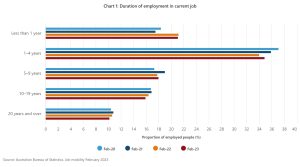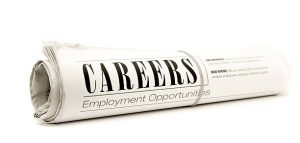How Long Should You Remain in One Job?
In times past, people’s working lives often played out over many years at one company, but now the world has vastly changed. These days it is common to shift between jobs and organisations, but this practice raises questions as to what is today considered the Goldilocks time to spend in a job? How often do…
In times past, people’s working lives often played out over many years at one company, but now the world has vastly changed. These days it is common to shift between jobs and organisations, but this practice raises questions as to what is today considered the Goldilocks time to spend in a job?
How often do Australian Workers Change Jobs These Days?
The following chart provides insight into how regular people have change jobs in recent years.

Job Mobility in Relation to Age
Younger workers are generally more mobile than older workers. In February 2023, the job mobility rates for selected age groups were as follows (ABS 2023):-
- Aged 15 – 24 years – 14.9%.
- Aged 25 – 44 years – 11.2%.
- Aged 45 – 64 years – 5.9%.
- Aged 65 years and over – 2.1%.
It is not surprising that young people change jobs more frequently than older people (the average job tenure for Australians aged 25-35 is 2 years and 8 months). There is often a degree of experimentation required for new entrants to the workforce to find a job that best fits their personal requirements. In addition, a more frequent change in jobs is commonly a way of fast-tracking the development of skills and experience on which to establish a future career.
There are no Hard and Fast Rules on How Long to Stay in a Job
The reality is that people change jobs for a multiplicity of reasons including personal career aspirations, personal growth requirements, to gain new skills, the need for a new challenge or simply that they have achieved what they set out to do when they took on the role.
Consider Time of Tenure from an Employers Point of View
When an employer is evaluating you for a job, they will commonly view your past employment history as an indication of what your career will look like with them.
Employers will often be accepting of a history of you leaving one job after a short period of time but if you regularly leave jobs after a short period of time, it can really prompt questions about your ability to stick it out or lead them to query your performance history. Be mindful that it is an expensive process for an employer to engage, onboard and train a new employee. You can understand that they will be evaluating whether, as a new employee, you will remain with the company long enough for them to justify the resources that will be invested in you.
On the other hand, if you stay in one organisation or one job without promotion, for a long period of time, an employer may question whether you lack drive or ambition or whether you are used to a particular way of doing things and have become comfortable and inflexible.
When you are being interviewed for a change in employment, it is important that you are aware of the red flags that may emerge from your employment history, whether it be that you are in danger of being perceived as a job hopper or the opposite; someone who has remained in a role for too long, not venturing beyond their comfort zone, stagnating and failing to learn new skills.
As a candidate, you need to be aware of the perception that an employer gain from your resume and provide them with reassurance that you will remain in the position long enough to make a positive contribution to the organisation, or that you have the capability to be adaptable and flexible when encountering a new and unfamiliar environment.
The Latest Updates
Let’s look at the current trends in job demand and talent availability in the agriculture and agribusiness sector in Australia over the second half of 2023 and the first quarter of 2024. There was a weakening of job demand in this sector but a slight improvement in candidate availability and job interest during this period….
Employee retention matters. Organisational issues such as training time and investment, lost knowledge, mourning, insecure co-workers and a costly candidate search aside; failing to retain a key employee is costly. Various estimates suggest that losing a middle manager costs an organisation up to 100 percent of their salary. The loss of a senior executive is…
It is widely acknowledged that finding and hiring superior talent is a major source of competitive advantage for organisations, hence keeping abreast of the tools involved in the hiring process is, by itself, a source of competitive advantage. If we reflect on changes to hiring over the last 30 years, a revolution has taken place….











